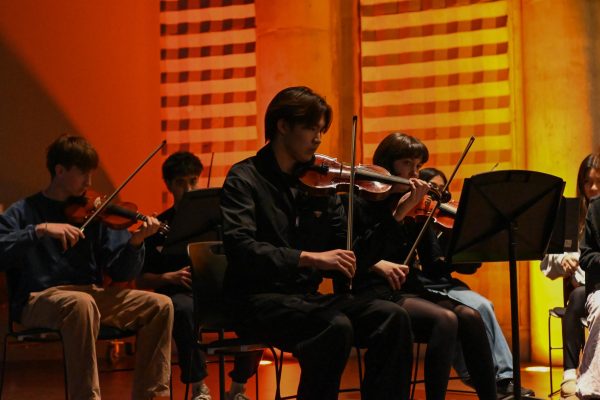English department shifts curriculum, including poetry, emphasizing diversity
In an English 1 class, students read and reflect on their semester in English.
A class of ninth graders sits in a circle of closely connected desks, and soon the room fills with the sound of their indistinguishable voices. Stanza by stanza, using a practice they learned at the beginning of the unit, each student reads a poem from the collection “Counting Descent” by Clint Smith out loud to themselves. The collection tells a coming-of-age story that covers topics of familial descent, systemic oppression and joy. With each vowel spoken, every voice catches each assonance and alliteration, as highlighters glide over the pale page. Although the English 1 teachers constantly seek to find texts that offer chances for close analysis, this opportunity to explore poetry has been a new addition.
This year, the English 1 team replaced “The Catcher in the Rye” with the collection “Counting Descent,” a change aligned with the English 1 teachers’ continuous mission to include diverse voices and a range of contemporary and classical texts in a frequently adjusted curriculum.
“These conversations are ongoing, constantly,” English teacher Rachel Nielsen said. “We are constantly reading texts that we’ve heard of exploring new things, having conversations with each other, about particular texts that we think might be beneficial.”
For the past six to seven years, the department had been searching for a poetry text with the right fit for the course, Ms. Nielsen said, taking into account the genre, style and the analysis skills the English 1 course aims to target.
“‘Counting Descent’ allowed us to have conversations about some very contemporary issues such as protest, canon, Black Lives Matter,” Ms. Nielsen said. “This was the vehicle by which they could start to explore their own voices, and the ways that they wanted to use language for their own means.”
Ninth grader Lisa Tao was able to use outlets such as performance and art to explore the poetry.
“We were able to dissect a more modern perspective of protest and coming-of-age, which was more relatable than a typical classic we would read in its place,” Lisa said.
This year, with this new text, English teacher Sari Hernandez noticed a shift in the class’ conversations, where the discussion covered topics that differed from previous years when teaching “The Catcher in the Rye.”
“We’ve discussed the importance of simultaneously but equally valuing the reality of what it means to be Black in America, the systemic oppression and systemic violence,” Ms. Hernandez said.
Students also appreciated the representation that “Counting Descent” offers to the English curriculum.
“I think that it’s essential that the English curriculum includes texts from diverse voices,” Lisa said. “We are living in a constant state of reform, and literature from different backgrounds allows students to see parts of themselves in a world where that may not always be the case.”
Through performance, reading the poems out loud, annotation, personal reflection and discussion, the new addition to the curriculum encompasses a wide range of the English department’s goals.
“We’re more than the marginalization we experience,” Ms. Hernandez said. “That’s what we appreciated about this poetry collection is that it has both of these pieces. There are poems that are truly just like centralizing joy and love and use these universal themes, but they also do not hide away from the ugly truths of white supremacy that pervades our community.”




























































